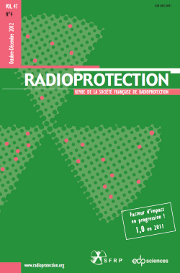Article contents
Screening the importance of soil micro-organismson radionuclides mobility
Published online by Cambridge University Press: 17 June 2005
Abstract
In surface soils, the native physical and chemical properties of the abiotic components control most of the sorption-desorption processes. Moreover, micro-organisms may significantly modify the speciation of trace elements and/or radionuclides and subsequently determine their fate, to a large extent. Micro-organisms, mainly bacteria and fungi, develop many strategies that may affect indirectly or directly the behaviour of trace elements. Due to their activity, changes in the pore-water composition, e.g. pH, redox-potential, may occur in relation with organic acid production or solid phase alteration, reduction or oxidation of metallic oxi-hydroxides, and mineralization of organo-metallic complexes. Micro-organisms may also directly modify the speciation of radionuclides as a result of bio-accumulation in living cells, biosorption on cellular components, direct reduction or oxidation, biomethylation, etc. Each one of these microbial processes may either increase or decrease radionuclide mobility, depending on the element, the soil reactivity and the environmental conditions. The resulting effect of these processes is still poorly known. This literature review intends to present a comprehensive overview of the role of micro-organisms on radionuclide mobility. It aims at classifying these elements, regarding to their potential sensitivity to these microbial processes. It summarizes the theoretical effect of these mechanisms, resulting in a potential increase or decrease of the solid-liquid distribution. The environmental significance of such processes for various biogeochemical radionuclides cycles still remains to be confirmed by experiments. (This study is part of a research program supported by Andra).
- Type
- Research Article
- Information
- Copyright
- © EDP Sciences, 2005
- 10
- Cited by


